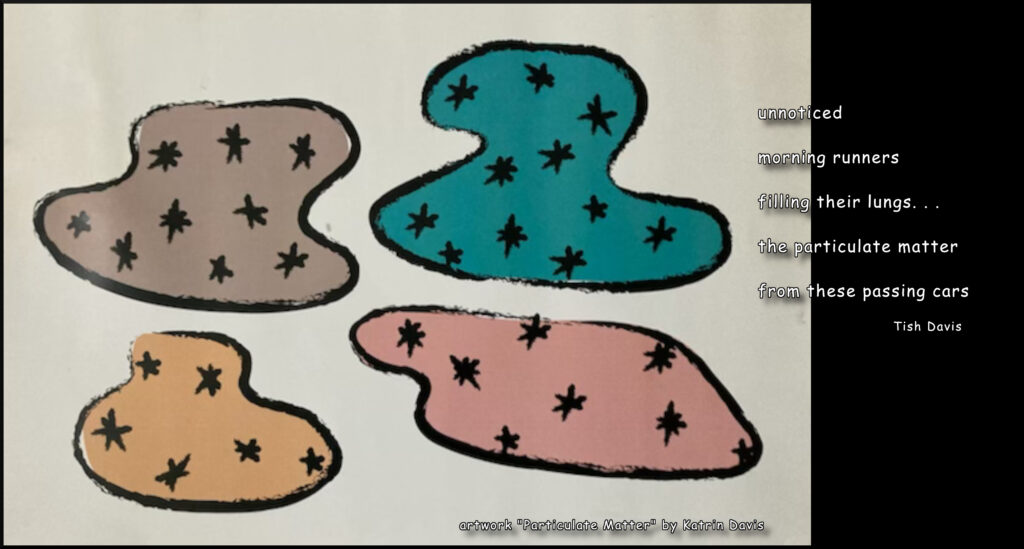Particulate Matter
Artwork: Katrin Davis
Tanka: Tish Davis

Raising awareness of global concerns through a marriage of the arts.
Artwork: Katrin Davis
Tanka: Tish Davis

By Jenny Ward Angyal
Gibsonville, NC, USA
forests
burning far away
I bow
to the wood thrush
singing orisons unseen
I follow a path along the brook, through mountain laurel and rhododendron. The stone hut stands half-hidden among the trees, its roof green with moss. Thick, curved walls enclose an oval of coolness in the summer heat. Elliptical windows admit a little light. As my eyes adjust, I notice a message chalked on the sloping ceiling:
maybe
the world isn’t dying . . .
maybe
she’s heavy
with child
*Note: The second tanka is a ‘found poem.’
~From my book Earthbound: Tanka-Prose & Haibun, 2022
By Jenny Ward Angyal
Gibsonville, NC, USA
I used to think
it would last forever—
the swallows
coming home each year,
the green hills blossoming
on my path
one pure white feather
I carry with me
news of a dying planet,
a widening war
the bridge
across the creek—
I cannot see
the barred owl
calling from the other side
a water strider
dimples the surface,
an otter
rises and vanishes . . .
the stream flows on
spring beauties bloom
among tiny handprints
in the mud
I kneel on the bank
of the passing moment
~First published as the Afterword to A Worn Chest by Joy McCall & Tom Clausen, 2022
Reprinted in my book The Wind Harp: Tanka Pentads, 2023
By Jenny Ward Angyal
Gibsonville, NC, USA
Hokusai painted them, Issa wrote about them, and Mao did his best to exterminate them.
It’s true that Eurasian tree sparrows gorge themselves on spilled grain. So, during the Great Leap Forward, the Four Pests Campaign encouraged schoolchildren to kill as many sparrows as they could, tearing up nests and smashing eggs. People beat pots and gongs to drive them from their roosts until the birds dropped from exhaustion. A billion sparrows died. With few birds left to eat them, hungry locusts swarmed through grain fields and rice paddies. Upwards of forty million people starved.
gazing
into Pandora’s box—
nothing left
but a tattered feather
and a mirror full of cracks
By Theresa Cancro
Wilmington, Delaware, USA
murky lake . . .
long tears cloud
the buffalo’s eye
By Jenny Ward Angyal
Gibsonville, North Carolina, USA
A glimpse of white wing bars, half hidden among juniper and honeysuckle. Uncertain, I find a picture on my phone and the app plays several notes of a song. At once a tiny being—no more than a quarter of an ounce—confronts me, scolding loudly, warning me away from a world that belongs to him.
sunlit hedgerow—
the kinglet reveals
his ruby crown
By Jenny Ward Angyal
Gibsonville, North Carolina, USA
all of us
from blowfly to blue whale
birthright citizens
of a dying planet . . .
who will have the last word?
By Melissa Dennison
Bradford, Yorkshire, England
From boreal forests in the Arctic Circle to Hawaii and Malibu, every year more and more of our planet is burning.
By Florence Heyhoe
County Down, Northern Ireland
lipstick —
the cosmetic trade
flaying donkeys
Further reading: End the Donkey Skin Trade
By Rebecca Drouilhet
Picayune, Mississippi, USA
the urge
to flow beyond my banks . . .
a drop of water
longing to go
where oceans rise and fall
By John Pappas
Boston, Massachusetts, USA
By: Steve Van Allen
Cincinnati, Ohio, USA, Earth
global warming?
a beautiful spring day
late October
By Bryan D. Cook
Orleans, Ontario, Canada
Cloaked from earthling sight, two extraterrestrial fortune hunters gaze down at planet Earth.
“Which bit do you want?”
“I’d take the blue stuff but it’s so full of plastics that I’ll pass. How about you?”
“ I’d take the green-brown stuff but it’s overrun with pillaging apes. I’ll pass too.”
“ Let’s go find another trophy world and leave this one’s sun to evaporate away its atmosphere.”
“O.K., pity though, it looked like such a precious blue gem on the trajector screen!”
ocean highway
too fast and busy
for humpbacks
By Diana Webb
Leatherhead, Surrey, UK
It towers above the park this tree . An ancient haven with countless generations of birds to its name. It teems with wildlife down through its roots.
Painters have painted it, poets penned poems on it, children danced and sang round the girth of its trunk.
Now there are plans for this space with a landmark. High rise tower blocks. Multi-story car park. Big hotel. Lots and lots and lots of concrete which will always resound with the multi-wave echo of the crash of a tree.
layered picnic rug
with shade of myriad summers
we shake out the tears
By Theresa A. Cancro
Wilmington, Delaware, USA
sooty smokestacks
where dinosaurs
once grazed
By Theresa A. Cancro
Wilmington, Delaware, USA
faint aurora . . .
a polar bear clambers
onto the shrinking floe
Theresa A. Cancro
Wilmington, Delaware, USA
unmixed oil slicks press against dolphin skin
fall leaves…
a plastic bag gapes
wide as Texas
First published in The Other Bunny, June 11, 2018
By Theresa A. Cancro
Wilmington, Delaware, USA
broken bottle
at the end of the path
blue-eyed grass
First published in Plum Tree Tavern, 2015
By Theresa A. Cancro
Wilmington, Delaware, USA
crack of dawn —
fireflies escape
the jar
First published in Chrysanthemum #18, 2015
By Steve Van Allen
Cincinnati, Ohio, USA, Earth
hawaiian honeycreeper
guam flying fox
bachman’s warbler
yellow blossom pearlymussel
scioto mad tom
mariana fruit bat
Gone forever
plastic
pollution
logging
drilling
hate
asphalt
microplastics
cancer
Cannot leave soon enough
butterfly
the only thing moving
this hot afternoon